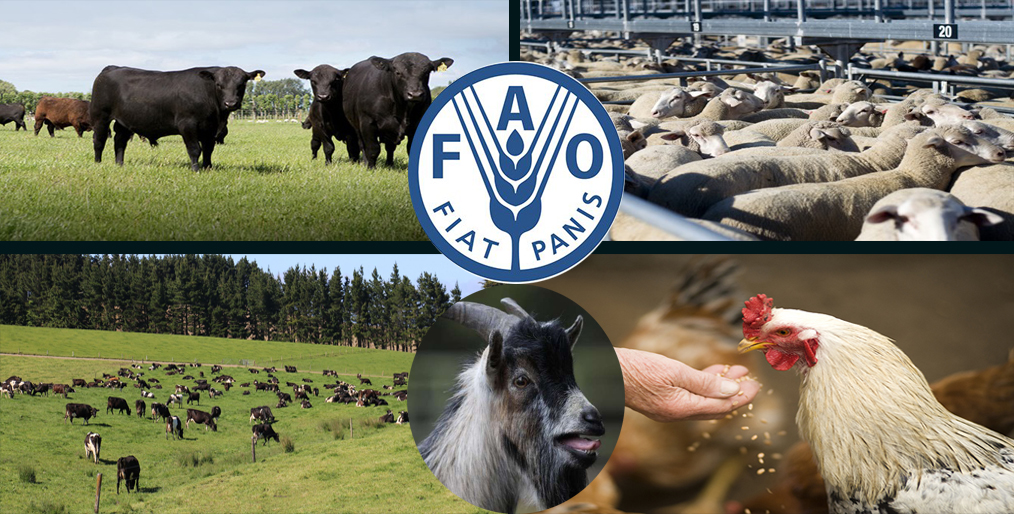
 The link between human and animal populations, and with the surrounding environment, is particularly close in developing regions where animals provide transportation, draught power, fuel, clothing as well as proteins (meat, eggs and milk).
FAO attributes to animal health as a necessary tool for a more sustainable livestock production. Animal products do not only represent a source of high-quality food, but are also a source of income for many small farmers and animal holders in developing countries. Economic growth is accompanied by an increase in consumption of animal products. Livestock contribution to agriculture GDP is significant in many developing countries.
Changes in livestock production increase the potential for new pathogens to emerge, grow and spread from animals to humans on a global scale. Healthy animals are closely related to healthy people and a healthy environment.
A comprehensive approach – the One Health approach – is needed to deal with the complexities of changing disease landscapes. This approach gives greater emphasis to agro-ecological resilience, the protection of biodiversity, the efficient use of natural resources and the safety of food supply chains particularly in areas worst afflicted by poverty and animal disease. Speeding up response times, by early detection and reaction, including at the driver level, is essential.
Animal health issues
FAO focuses on several overlapping animal health issues:
zoonotic diseases
transboundary diseases
insect-borne diseases
diseases of production and hygiene
veterinary public health
One Health
food safety
strengthening of veterinary systems
antimicrobial resistance
FAO implements animal health programmes related to the establishment of best practices in the prevention and control of priority diseases which threaten animal production, public health and trade through its international and regional networks, animal health projects and disseminating practical information.
These include:
The FAO Emergency Prevention System (EMPRES) Animal Health develops strategies for intervention and improved management. It works to monitor and give early warning and ultimately to prevent animal diseases.
The FAO Food Chain Crisis Management Framework, grouping the three thematic EMPRES, provides an effective, multidisciplinary and coherent approach to threats affecting the food chain by integrating prevention, early warning, preparedness and response.
The Crisis Management Centre for Animal Health is FAO’s rapid response unit which works alongside governments to prevent or limit the spread of high-impact animal diseases.
One recent successful example has been the global eradication of rinderpest in 2011.
Source: Online/SZK
The link between human and animal populations, and with the surrounding environment, is particularly close in developing regions where animals provide transportation, draught power, fuel, clothing as well as proteins (meat, eggs and milk).
FAO attributes to animal health as a necessary tool for a more sustainable livestock production. Animal products do not only represent a source of high-quality food, but are also a source of income for many small farmers and animal holders in developing countries. Economic growth is accompanied by an increase in consumption of animal products. Livestock contribution to agriculture GDP is significant in many developing countries.
Changes in livestock production increase the potential for new pathogens to emerge, grow and spread from animals to humans on a global scale. Healthy animals are closely related to healthy people and a healthy environment.
A comprehensive approach – the One Health approach – is needed to deal with the complexities of changing disease landscapes. This approach gives greater emphasis to agro-ecological resilience, the protection of biodiversity, the efficient use of natural resources and the safety of food supply chains particularly in areas worst afflicted by poverty and animal disease. Speeding up response times, by early detection and reaction, including at the driver level, is essential.
Animal health issues
FAO focuses on several overlapping animal health issues:
zoonotic diseases
transboundary diseases
insect-borne diseases
diseases of production and hygiene
veterinary public health
One Health
food safety
strengthening of veterinary systems
antimicrobial resistance
FAO implements animal health programmes related to the establishment of best practices in the prevention and control of priority diseases which threaten animal production, public health and trade through its international and regional networks, animal health projects and disseminating practical information.
These include:
The FAO Emergency Prevention System (EMPRES) Animal Health develops strategies for intervention and improved management. It works to monitor and give early warning and ultimately to prevent animal diseases.
The FAO Food Chain Crisis Management Framework, grouping the three thematic EMPRES, provides an effective, multidisciplinary and coherent approach to threats affecting the food chain by integrating prevention, early warning, preparedness and response.
The Crisis Management Centre for Animal Health is FAO’s rapid response unit which works alongside governments to prevent or limit the spread of high-impact animal diseases.
One recent successful example has been the global eradication of rinderpest in 2011.
Source: Online/SZK
Comment Now